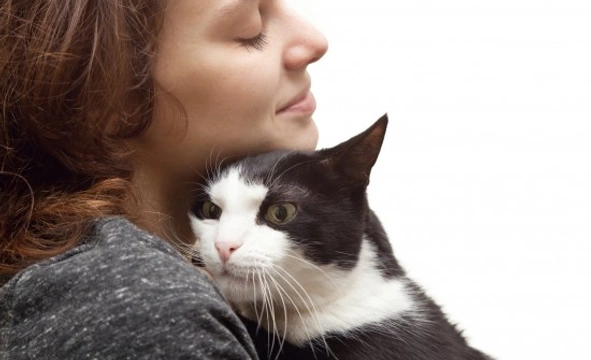
How Happy is Your Cat About Being Cuddled?
Cats can be funny creatures and if there is one thing they are very good at, it's letting you know when they want something! Some cats just can't get enough cuddles whereas others are not that keen on being stroked or even picked up by their owners. Some of our feline friends will accept being petted for a very short time before showing you how sharp their claws are and if you own one of these cats, you soon learn when to stop!
Recent studies carried out in Austria investigated just how and why some cats get stressed out when they are stroked and the conclusion was that they were not actually anxious about being cuddled, but rather by the fact there was something else in their lives that made them rather unhappy. As a result, when petted or stroked, these cats tended to overreact to the situation and preferred to be left alone.
Unfortunately, the researchers could not give a clear indication as to what might be upsetting the cats used in their studies because each one was very different to the other. However, they did believe that some degree of stress could be due to an animal being in poor health with two health issues being very much in evidence which are as follows:
- Skin complaints - stress can lead to skin conditions and loss of hair which is usually caused by a cat cleaning themselves too much in one or more areas of their bodies causing bald patches
- Cystitis - stress was also seen to be a trigger for urinary tract infections namely cystitis which these days is a condition very commonly seen in cats
The research also pointed to the fact that it is very hard to identify when a cat may be stressed out by something. The reason being simply they are quite shy animals and not that demonstrative, unlike their canine counterparts. A cat will not show you how they feel about things or when they are unhappy because they will simply tuck themselves away somewhere out of sight which is something they tend to routinely do for long periods during a 24 hours day anyway.
However, if a cat is extremely stressed out or anxious about something, they will very deliberately hide somewhere strange like under a sofa or high up on top of a wardrobe. The studies showed that cats do this because they go into a defensive mode and they do this before they can once again feel relaxed and comfortable about things.
Cats, unlike their canine counterparts don't have a very sophisticated system of signalling to other cats, animals or people they come into contact with. Dogs will typically work things out pretty quickly when they first meet another dog, cat or human and they do so by using very distinctive body language.
Where cats are concerned this can take a lot longer because they lack the same signalling capabilities. The study showed this to be one of the reasons why when a new cat is introduced to a home as a second cat, fur tends to fly for quite a long time.
What About Indoor Cats?
The study also looked at how happy cats are when they are forced to live as indoor pets"". The conclusion was that our feline friends don't actually need masses of room to roam around in for them to be truly happy. They just need to the basics which is a safe and secure area to live that is also quite interesting. However, an indoor cat would need a lot more interaction with their owners which is a sure fire way of ensuring their lives are as full as they need to be to keep them happy and content.
Why Cats Have Kept Many of their Wild Traits
One of the things the research did look into was why cats had kept so many of their ""wild"" traits even though they have been domesticated for centuries. One conclusion was that many unneutered female cats which are allowed to roam outside whenever they want end up mating with a male cat much as they would if they were in the wild. The conclusion was that this could be why some of our feline friends are less domesticated than others and the result is they have managed to keep many of their wilder traits.
However, where pedigree cats are concerned, this is not often the case because breeding programmes have been set in place which results in the characters of pure breed cats being a lot different than that of your average moggy. Another thing that's worth noting is that Breeders tend to socialise their kittens more because they know the importance of this when it comes to finding homes for them.
""



